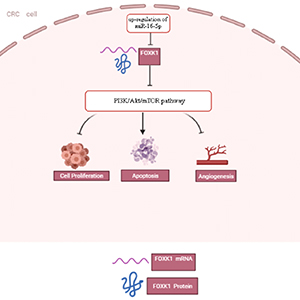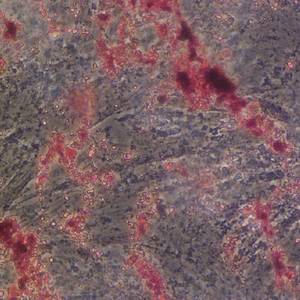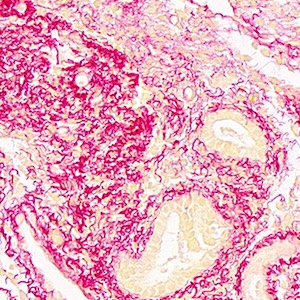microRNA-16-5p suppresses cell proliferation and angiogenesis in colorectal cancer by negatively regulating forkhead box K1 to block the PI3K/Akt/mTOR pathway

Submitted: 23 September 2021
Accepted: 23 March 2022
Published: 10 May 2022
Accepted: 23 March 2022
Abstract Views: 1054
PDF: 651
HTML: 19
HTML: 19
Publisher's note
All claims expressed in this article are solely those of the authors and do not necessarily represent those of their affiliated organizations, or those of the publisher, the editors and the reviewers. Any product that may be evaluated in this article or claim that may be made by its manufacturer is not guaranteed or endorsed by the publisher.
All claims expressed in this article are solely those of the authors and do not necessarily represent those of their affiliated organizations, or those of the publisher, the editors and the reviewers. Any product that may be evaluated in this article or claim that may be made by its manufacturer is not guaranteed or endorsed by the publisher.
Similar Articles
- Yan Wang, Jie Sun, Ninghua Yao, Correlation of the AKT/mTOR signaling pathway with the clinicopathological features and prognosis of nasopharyngeal carcinoma , European Journal of Histochemistry: Vol. 65 No. 4 (2021)
- X.C. Xu, X. Abuduhadeer, W.B. Zhang, T. Li, H. Gao, Y.H. Wang, Knockdown of RAGE inhibits growth and invasion of gastric cancer cells , European Journal of Histochemistry: Vol. 57 No. 4 (2013)
- ChenHui Zhu, LiJuan Lin, ChangQing Huang, ZhiHui Wu, Activation of Hedgehog pathway by circEEF2/miR-625-5p/TRPM2 axis promotes prostate cancer cell proliferation through mitochondrial stress , European Journal of Histochemistry: Vol. 68 No. 4 (2024)
- Xiaoyan Chu, Jun Lou, Yun Yi, Linlin Zhong, Ouping Huang, Knockdown of ARHGAP30 inhibits ovarian cancer cell proliferation, migration, and invasiveness by suppressing the PI3K/AKT/mTOR signaling pathway , European Journal of Histochemistry: Vol. 67 No. 2 (2023)
- Huiwen Li, Bo Huang, miR-19a targeting CLCA4 to regulate the proliferation, migration, and invasion of colorectal cancer cells , European Journal of Histochemistry: Vol. 66 No. 1 (2022)
- Yiming Zhang, Wanqiong Zheng, Liang Zhang, Yechun Gu, Lihe Zhu, Yingpeng Huang, LncRNA FBXO18-AS promotes gastric cancer progression by TGF-β1/Smad signaling , European Journal of Histochemistry: Vol. 67 No. 2 (2023)
- Ying Wang, Shifa Yuan, Jing Ma, Hong Liu, Lizhen Huang, Fengzhen Zhang, Substance P is overexpressed in cervical squamous cell carcinoma and promoted proliferation and invasion of cervical cancer cells in vitro , European Journal of Histochemistry: Vol. 67 No. 3 (2023)
- Yuhan Wang, Gang Wang, Xiaojun Liu, Dong Yun, Qing Cui, Xiaoting Wu, Wenfeng Lu, Xiwen Yang, Ming Zhang, Inhibition of APLN suppresses cell proliferation and migration and promotes cell apoptosis in esophageal cancer cells in vitro, through activating PI3K/mTOR signaling pathway , European Journal of Histochemistry: Vol. 66 No. 3 (2022)
- Y. Zhang, W.Y. Ye, J.Q. Wang, S.J. Wang, P. Ji, G.Y. Zhou, G.P. Zhao, H.L. Ge, Y. Wang, dCTP pyrophosphohydrase exhibits nucleic accumulation in multiple carcinomas , European Journal of Histochemistry: Vol. 57 No. 3 (2013)
- Xuanjin Zhu, Weilu Jia, Yong Yan, Yong Huang, Bailin Wang, NOP14 regulates the growth, migration, and invasion of colorectal cancer cells by modulating the NRIP1/GSK-3β/β-catenin signaling pathway , European Journal of Histochemistry: Vol. 65 No. 3 (2021)
You may also start an advanced similarity search for this article.
Publication Facts
Metric
This article
Other articles
Peer reviewers
2
2.4
Reviewer profiles N/A
Author statements
Author statements
This article
Other articles
Data availability
N/A
16%
External funding
N/A
32%
Competing interests
N/A
11%
Metric
This journal
Other journals
Articles accepted
57%
33%
Days to publication
228
145
- Academic society
- N/A
- Publisher
- PAGEPress Publications, Pavia, Italy

 https://doi.org/10.4081/ejh.2022.3333
https://doi.org/10.4081/ejh.2022.3333
















